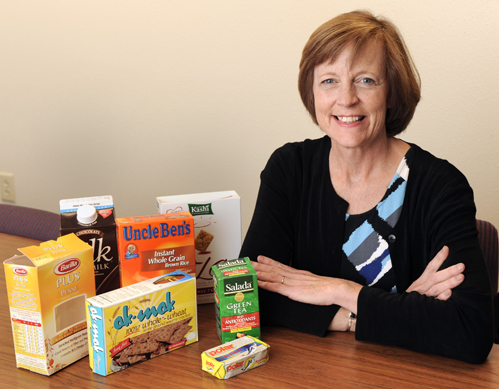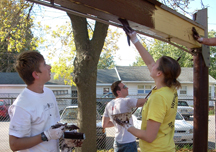Oct. 14, 2010

Photo by Leah Hansen.
Five questions for Sally Barclay
by Paula Van Brocklin
Editors' Note: This is the first of a periodic series in Inside Iowa State that will feature ISU faculty and staff, in their own words. Is there somebody you'd like to see featured? Do you have a question for someone? Let us know at inside@iastate.edu.
The Basics
- Name: Sally Barclay
- Position: Director of the Nutrition Clinic for Employee Wellness; registered and licensed dietitian
- Years at ISU: Eight
- Education: bachelor's degree in distributive studies (concentration in zoology, psychology and child development), ISU; master's degree in nutrition, Purdue University; dietetic internship, University of Kentucky, Lexington
Why did you choose to be a dietitian?
Because it was such a practical thing that would apply to everybody, and something that would be useful for myself and in raising a family. And then when I was in grad school my father went on dialysis. I saw how frustrated my mother was with his diet because the doctors were saying he's losing weight, he needs to eat more calories. But he couldn't have protein, he couldn't have sodium or potassium. And she's wondering, what do I feed him? I saw the relationship she had with the dietitian, and how empowering and important that relationship became to [my father's] health. I saw how [my mom] was struggling, and this person really came to her aid. I was very inspired by that. So I had personal reasons [for becoming a dietitian], but it also seemed like a science field working with people, which is really what I had been looking for all along.
If you could eat only one food for an entire week, what would it be?
I don't know that there's one food that would cover all your bases, but in terms of something I wouldn't get tired of and that would have some nutritional benefit, it would be peanut butter. I know that the protein and healthy fat would stay with me so I'd be satisfied, and I really enjoy it. I enjoy the flavor and the texture. It's also got a little saltiness going on. But it's got to be crunchy.
What's the big deal about employee wellness?
We've got research now showing that employee wellness programs do help the bottom line. They help to lower health care costs, but it goes even beyond that. It lowers absenteeism, and improves something called "presenteeism." That's when employees show up at work but aren't fully engaged because they have a lot of stress in their lives -- like a family problem -- so the productivity goes down. I think if we can address stress issues and get employees into a well situation -- as far as their environment, their eating and exercise -- that helps, too. I also think [an employee wellness program] tells employees "We care about you. We want you to have a good quality of life." And because our employees are here for a good chunk of time, eight hours a day or so, it's a good time to get them into healthy habits. They're a captive audience, so we should make the most of that.
What one thing could employees do to be healthier?
Eat breakfast. Your body goes all night without food and it needs proper fuel to function well the next morning. Eating a breakfast with lean protein will give you a good start to the day. Many skip or eat a meager breakfast and then play "catch up" with their eating all day. Studies show that breakfast eaters have better success at achieving and maintaining a healthy body weight.
What can employees do to perk up in the afternoon, instead of walking to the vending machine?
Definitely take a little walk on campus. A walk would get the blood circulating and bring back your energy. If you have either skipped lunch or had a very small lunch, you really are in need of some fuel at that point. But we all go for the candy or the chips to bring our blood sugar back up, and that's followed with a crash. Choose to have a healthful snack that includes some protein and some carbohydrates -- which would be the little pick-me-up. The protein would smooth things out and help them stay satisfied until they get home to prepare dinner. Try an apple with some nuts, or crackers and low-fat cheese; a combination is good. Bringing protein in there with some healthy carbs is really going to make a difference. But do the walk first. Maybe even just drink some water. I think a lot of times we get dehydrated and we think we're hungry.
